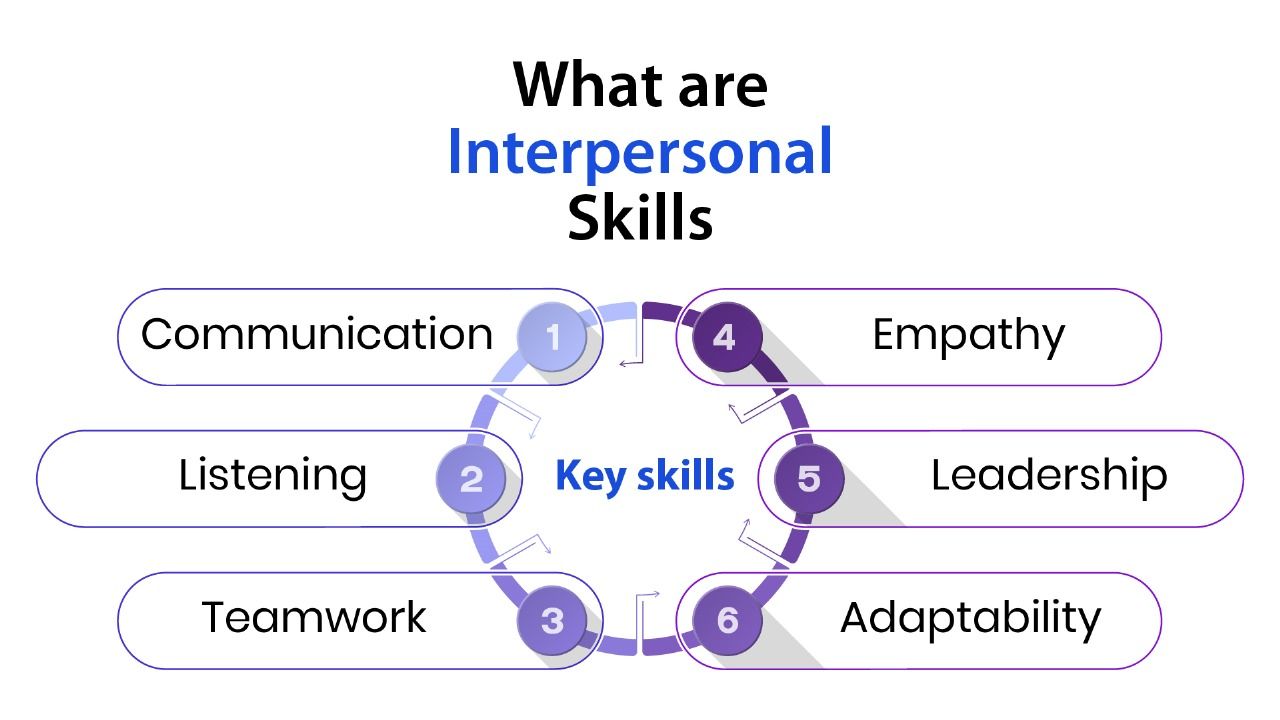
Overview
In today’s competitive world, landing a job or building a successful career requires more than just technical expertise. Employers and colleagues value how well you connect, communicate, and collaborate with others. That’s where interpersonal skills come into play. If you’ve ever wondered what interpersonal skills are, this blog will explain their meaning, provide clear examples, discuss their importance, and highlight their role in the workplace.
Key Points:
- Interpersonal skills are the way you connect, communicate, and work with people.
- Key skills: communication, listening, teamwork, empathy, leadership, adaptability.
- They boost careers, relationships, and confidence.
- Crucial in interviews, teamwork, leadership, and customer service.
- Improve with active listening, body language, empathy, and positivity.
- Hard skills are technical, while interpersonal skills are social
- Employers value them for productivity and smooth teamwork.
- Tech skills get you hired, people skills help you grow.
What Are Interpersonal Skills?
Interpersonal skills, often called people skills or soft skills, are the abilities that help you interact effectively with others. They consist of leadership, teamwork, empathy, communication, and conflict resolution. Unlike hard skills, which can be measured or certified, interpersonal skills are more about how you connect with people and build relationships.
In short when you ask what interpersonal skills are, the answer lies in your ability to listen, express yourself clearly, and maintain positive interactions in both professional and personal settings.
Examples of Interpersonal Skills
To better understand the concept, let’s look at some common examples of interpersonal skills:
- Communication:The ability to express ideas clearly through speaking, writing, or body language.
- Active Listening:Paying attention, asking questions, and showing genuine interest in others’ opinions.
- Teamwork: Working together with coworkers to accomplish common objectives.
- Problem-Solving:Finding solutions to conflicts or workplace challenges.
- Empathy:Understanding and respecting the feelings of others.
- Leadership:Inspiring and guiding individuals or teams toward success.
- Adaptability:Adjusting to new situations and remaining flexible under pressure.
These examples of interpersonal skills show how crucial they are for creating healthy work environments and successful professional relationships.
Importance of Interpersonal Skills
The importance of interpersonal skills cannot be overstated. Here’s why they matter in every aspect of life:
- Career Growth:Recruiters often prefer candidates with strong soft skills because technical knowledge alone is not enough to thrive.
- Stronger Relationships:Good interpersonal skills build trust and understanding, whether at work, home, or in social settings.
- Conflict Management:Being able to resolve disputes peacefully saves time, stress, and resources.
- Effective Collaboration:Team-based projects succeed when members communicate and respect one another.
- Improved Confidence:Strong people skills enhance self-esteem and make you more approachable.
When you think about what interpersonal skills are, remember that they are often the hidden factor that separates average performers from leaders.
Interpersonal Skills in the Workplace
In professional life, interpersonal skills in the workplace are as important as technical qualifications. Let’s explore how they impact career success:
- During Interviews:Employers assess not just your knowledge but also how you interact, make eye contact, and answer questions.
- Team Collaboration:Projects require cooperation, and good interpersonal skills ensure smooth teamwork.
- Leadership Roles:Managers with empathy, communication skills, and problem-solving abilities build stronger teams.
- Customer Interaction:Sales, support, and service roles heavily rely on communication and empathy.
- Networking: Having good interpersonal skills makes it easier to establish business relationships.
Employers in every industry whether IT, healthcare, finance, or hospitality value candidates who demonstrate effective communication, adaptability, and teamwork.
👉 If you’re preparing your profile, you may also want to learn how to write an effective About Me in your Resume
How to Improve Interpersonal Skills
If you feel your people skills need polishing, here are some practical tips:
- Practice Active Listening:Focus on understanding, not just responding.
- Work on Nonverbal Cues:Maintain good eye contact, open posture, and positive body language.
- Seek Feedback:Ask colleagues or mentors about how you communicate and collaborate.
- Develop Empathy:Make an effort to understand other people's points of view.
- Enhance Communication:Speak clearly, be concise, and avoid jargon.
- Stay Positive:A positive attitude makes you approachable and trustworthy.
- Engage in Team Activities:Group work, volunteering, or workshops can strengthen teamwork skills.
You can improve your ability to interact with people both at work and outside of it by practicing frequently
Interpersonal Skills vs. Hard Skills
Many people confuse interpersonal skills with technical expertise. Here’s the difference:
- Hard Skills – Tangible abilities such as coding, accounting, or graphic design.
- Interpersonal Skills – Intangible traits like teamwork, adaptability, and emotional intelligence.
A job-winning candidate usually has a balance of both. For example, a software developer who is highly skilled in coding but cannot work in a team may struggle to succeed in a corporate environment.
Why Employers Value Interpersonal Skills
Companies in today’s global economy look for employees who can adapt to multicultural teams and dynamic challenges. The importance of interpersonal skills to employers includes:
- Higher productivity through collaboration.
- Better client satisfaction in service-based roles.
- Stronger leadership potential within organizations.
- Reduced workplace conflicts and smoother workflows.
It’s no wonder employers often ask behavioral questions in interviews to test how candidates handle situations requiring strong interpersonal abilities.
Conclusion
So, what are interpersonal skills? They are the fundamental characteristics that enable you to interact, cooperate, and establish a strong connection with people. From active listening and empathy to leadership and adaptability, these skills play a vital role in personal growth and career success.
At CV Circle we believe that highlighting your interpersonal skills is just as important as showcasing your technical expertise.
By focusing on improving your interpersonal skills, you not only enhance your workplace performance but also build stronger, more meaningful relationships in life. Remember, technical expertise may get you the job, but interpersonal skills help you keep it and grow further.
👉 Start practicing today, improve your communication, show empathy, and embrace teamwork. Your personal and professional lives will appreciate it.
